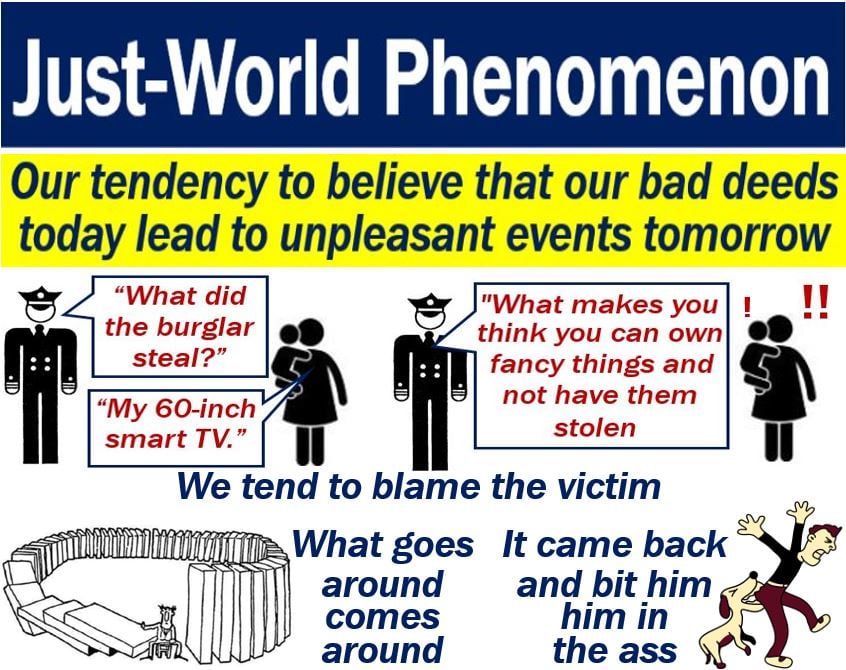Just-world phenomenon – definition and meaning
The just-world phenomenon is our tendency to believe that we eventually get what we deserve. In other words, we believe that it is a just world. We want to believe that the world is fair. Hence we look for ways to explain injustice. We rationalize away injustice by believing that the victim was actually to blame.
Put simply; we believe that bad things eventually happen to people who did bad things. In other words, we eventually get our comeuppance.
We also call it the just-world hypothesis.
Conversely, the just-world phenomenon is our tendency to believe that there will be rewards for our good deeds. We believe that if we perform good deeds today, nice things will happen to us tomorrow.
VeryWell.com says the following regarding the term:
“The just-world phenomenon is the tendency to believe that the world is just and that people get what they deserve.”
“Because people want to believe that the world is fair, they will look for ways to explain or rationalize away injustice, often blaming the person in a situation who is actually the victim.”

When there is a recession, i.e. when GDP shrinks, unemployment rises. We know this happens when the economy shrinks. However, we still tend to blame the victims in such circumstances.
Just-world phenomenon and divine providence
Humans have long believed that our actions will eventually bring morally fitting and fair consequences.
This belief implies that cosmic justice, divine providence, and destiny exist. It implies that order and stability also exist.
There are many figures of speech in different languages that reflect the just-world phenomenon. In the English language we have the following:
- – “You got what was coming to you.”
- – “You reap what you sow.”
- – “Chickens come home to roost.”
- – “What goes around comes around.”
Why blame the victim?
Melvin J. Lerner, an Amerian Professor of Social Psychology, wrote about the just-world phenomenon in the 1980s. In 1980, he wrote “The Belief in a Just World: A Fundamental Delusion.”
He was co-editor of the first volume devoted to the “Justice Motive,” which came out in 1981.
Lerner was struck by witnessing the tendency of people to blame victims for their suffering. That tendency pushed him to try to determine why this happened.
While he was training to become a psychologist, he observed how health care practitioners treated mentally ill patients.
He knew that the clinicians were professional and kindhearted people. However, he noticed that they blamed their patients for their own suffering.
Lerner also witnessed his fellow students disparage people who were poor. In fact, they seemed oblivious to the circumstances that contributed to their poverty.
When studying rewards, he noticed something interesting. When two people were chosen at random to receive a reward for a task, people praised the randomly rewarded one more. They barely praised the person who did not randomly get a reward.
Lerner’s desire to understand what made people behave this way led him to his first experiments. In fact, they were experiments on what we now call the just-world phenomenon or just-world hypothesis.
Video – Just-world phenomenon
In this video, Myles Dyer talks about the just-world phenomenon. He uses the term ‘just-world hypothesis.’ He begins by talking about British soldiers making Germans look at a concentration camp after WWII ended.
The German civilians looked in horror at the camp. However, some wondered what horrible things the people in there had done to end up in such a place.

